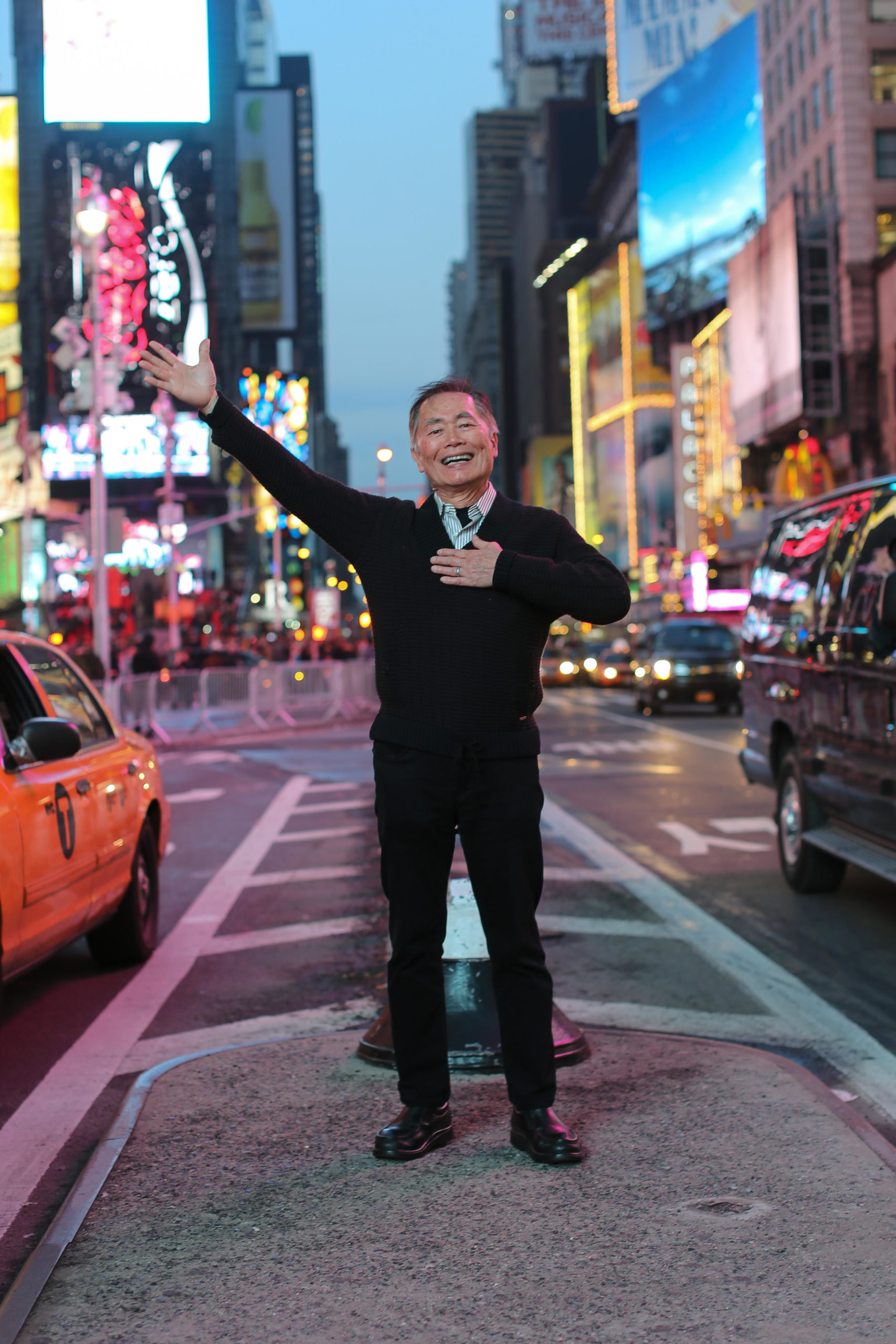The TV Star and Activist Reflects on His Journey
By Frank Rizzo
At age 68 in 2015, George Takei — most popularly known as Hikaru Sulu, helmsman of the USS Enterprise in the ’60s television series “Star Trek” — came out publicly as a gay man. It was a watershed moment because of the widespread popularity of the series and its subsequent film spinoffs. In February, Takei, who turns 83 in April, received International Festival of Arts & Ideas’ annual Visionary Leadership Award in New Haven. The award is presented “to a leader whose trailblazing work impacts the world.” I talked with Takei about his eventful life: when he was four and his family was imprisoned for nearly four years in internment camps during World War II because they were of Japanese heritage, then his career as an actor in stage film and television – but I most wanted to know what his life was like as a first-closeted and then as an out gay man. He lives in Los Angeles with his husband, Brad Takei. They have been together for 33 years. “The government imprisoned me for four years for my race; I imprisoned myself about my sexuality for decades,” he says. “You can’t imagine the kind of sentry towers you can build around your heart. Throughout most of my adult life, I was imprisoned behind invisible barbed-wire fences that had the sharp, hard barbs of prejudice against LGBTQ people.”
Q: When did you first think of yourself as gay?
A: The word “gay” was unknown to me [when I was young]. I was about eight or nine years old and I noticed the other boys would say things like, “Sally’s cute.” I thought Sally was nice but I didn’t get excited like they did. And in junior high school when Monica was blossoming out into womanhood, they would say, “Wow, Monica’s hot.” I didn’t feel the way they did. I thought Monica was nice, too, but it wasn’t anything to get excited about. But all I thought to myself was, Bobby was really so cute and had the sweetest smile. There were other kids in school who were kind of effeminate, carrying their books pressed to their chest, or had a slight swish, and the other boys would look down on them. I didn’t want to be one of those. I had prejudice against me already for having been in a prison camp, so I tried to act like the other boys. So I, too, went, “Yeah, Sally’s really nice.” But that was acting on my part. My imprisonment when I was a child was possible and rationalized because we were visibly different, and now I was discovering I was different in ways other than my Japanese face. But I didn’t want to be sneered at yet again, so I acted like the other boys. It wasn’t until into my teens that I heard the word “gay.” At that time, I thought I was the only one who felt the way I did. It was a gradual realization over a long period of time that I understood exactly what it was. That’s what most people don’t understand. You don’t suddenly become gay. It was a growing realization. At least for me.
Q: When was your first sexual experience?
A: I was 14 at summer camp and there was this good-looking, blond camp counselor and he wore tight T-shirts and he had a good build. What struck me about him was – you know when blond people get tanned and their forearm hair turns a shiny, glistening yellow? That to me was sexy. One night he came to my cabin and started toying with me and he exposed himself to me and I was excited by that. My first one was this golden Greek god.
Q: Sulu was kind of a sex symbol, too. In one episode of ‘Star Trek’ he was shirtless and brandishing a sword. Did you get fan mail?
A: I did, and one was really rather creepy [and enclosed something disgusting] and sent from Brooklyn. So whenever I was in New York City, I was always skittish about going to Brooklyn. (Laughs.)
Q: Did you wish Sulu was gay?
A: For the most recent “Star Trek” motion picture in 2016, they recast a younger actor, John Cho, as my character, and the writers were planning to honor me for my activism with LGBTQ issues by making Sulu gay and they asked me what I thought about it. I asked them to let me think about it. Then I thought Sulu was created as a straight character because he could not be gay [when the series ran in the 1960s]. In fact, Sulu had a daughter who became a helmsman in “Star Trek: The Next Generation.” But rather than me being honored, the right person to pay tribute to was Gene Roddenberry, who created the show with Sulu being straight, so I felt that would not be honoring him. The real tribute should be to Gene. The writers could have created a new character who lived in the 23rd Century as a gay man, and how that was an asset to the fleet because he saw things from another vantage point. But they didn’t. I once told Gene, “You’re breaking new ground here with the series,” because up until then, Asians were always portrayed in stereotypes, and here for the first time was an Asian character who was a proud member of the leadership team and the best helmsman in the Starfleet – who also had a great build.









More Stories
Broadway Review: Art
Fall Arts Preview: Emus, Foxes and Eric Clapton, Too
How Can They Keep from Singing?